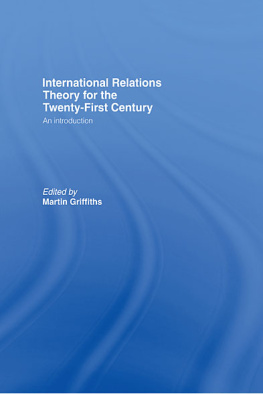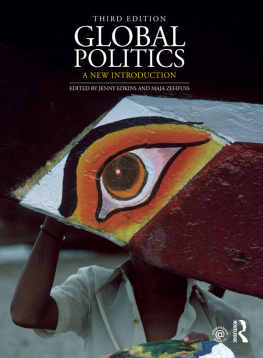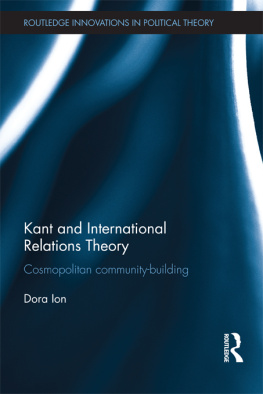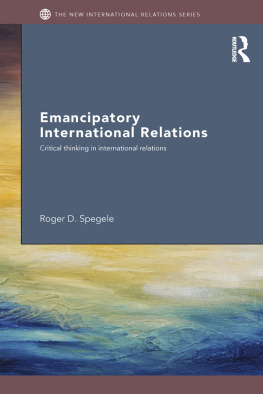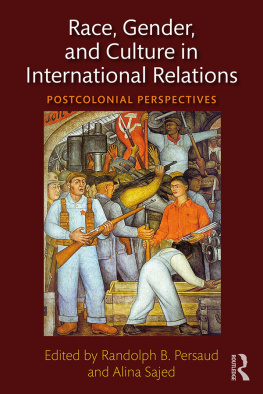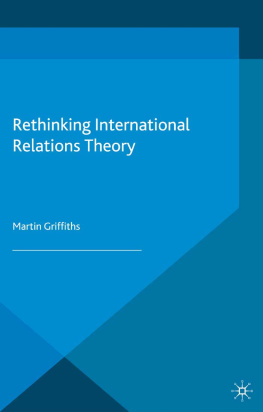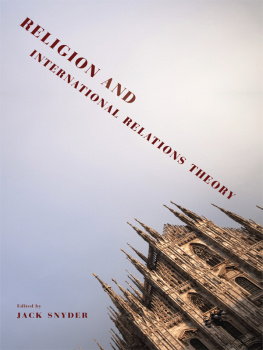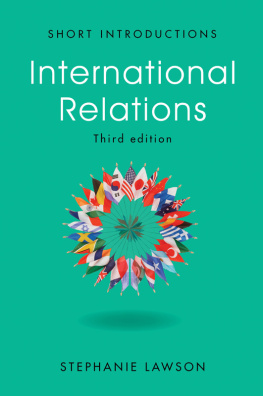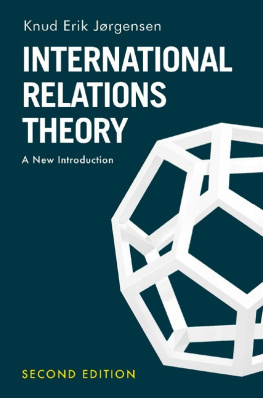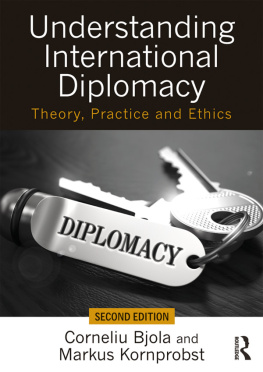International Relations Theory for the Twenty-First Century
International Relations (IR) theory has been the site of intense debate in recent years. A decade ago it was still possible to divide the field between three main perspectives Realism, Liberalism and Marxism. Not only have these approaches evolved in new directions, they have been joined by a number of new isms vying for attention, including feminism and constructivism.
International Relations Theory for the Twenty-First Century is the first comprehensive book to provide an overview of all the most important theories within international relations. Written by an international team of experts in the field, the book covers both traditional approaches, such as realism and liberal internationalism, as well as new developments such as constructivism, poststructuralism and postcolonialism.
The books comprehensive coverage of IR theory makes it the ideal text for teachers and students who want an up-to-date survey of the rich variety of theoretical work and for readers with no prior exposure to the subject.
Martin Griffiths is Associate Professor in International Relations in the Department of International Business and Asian Studies at Griffith University, Brisbane.
International Relations Theory for the Twenty-First Century
An introduction
Edited by
Martin Griffiths

LONDON AND NEW YORK
First published 2007
by Routledge
2 Park Square, Milton Park, Abingdon, Oxon OX14 4RN
Simultaneously published in the USA and Canada
by Routledge
270 Madison Avenue, New York, NY 10016
Routledge is an imprint of the Taylor & Francis Group, an informa business
This edition published in the Taylor & Francis e-Library, 2007.
To purchase your own copy of this or any of Taylor & Francis or Routledges collection of thousands of eBooks please go to www.eBookstore.tandf.co.uk.
2007 Editorial selection and matter; Martin Griffiths; individual chapters the contributors.
All rights reserved. No part of this book may be reprinted or reproduced or utilised in any form or by any electronic, mechanical, or other means, now known or hereafter invented, including photocopying and recording, or in any information storage or retrieval system, without permission in writing from the publishers.
British Library Cataloguing in Publication Data
A catalogue record for this book is available from the British Library
Library of Congress Cataloging in Publication Data
International relations theory for the twenty-first century : an introduction / edited by Martin Griffiths.
p. cm.
Includes bibliographical references and index.
1. International relationsPhilosophy. I. Griffiths, Martin, 1961
JZ1305.I5658 2007
327.101dc22
2007011599
ISBN 13: 978-1-134-17895-7 ePub ISBN
ISBN 10: 0-415-38075-8 (hbk)
ISBN 10: 0-415-38076-6 (pbk)
ISBN 10: 0-203-93903-4 (ebk)
ISBN 13: 978-0-415-38075-1 (hbk)
ISBN 13: 978-0-415-38076-8 (pbk)
ISBN 13: 978-0-203-93903-1 (ebk)
List of contributors
Rita Abrahamsen is Reader in the Department of International Politics, University of Wales, Aberystwyth.
Alex J. Bellamy is Professor in the School of Political Science and International Studies, University of Queensland.
Tom Conley is Senior Lecturer in the School of International Business and Asian Studies, Griffith University.
Jenny Edkins is Professor in the Department of International Politics, University of Wales, Aberystwyth.
Colin Elman is Associate Professor in the Department of Political Science, Arizona State University.
Cynthia Enloe is Research Professor of International Development and Womens Studies, Clark University.
Martin Griffiths is Associate Professor in the Department of International Business and Asian Studies, Griffith University.
Anthony J. Langlois is Senior Lecturer in the School of Political and International Studies, Flinders University.
Andrew Linklater is Woodrow Wilson Professor in the Department of International Politics, University of Wales, Aberystwyth.
John MacMillan is Senior Lecturer in the Department of Politics and History, Brunel University.
Andrew Bradley Phillips is Lecturer in the School of Political Science and International Studies, University of Queensland.
Heather Rae is Fellow in the Department of International Relations at the Australian National University.
Mark Rupert is Professor of Political Science in the Maxwell School of Citizenship and Public Affairs, Syracuse University.
Preface
This book has been three years in the making. A number of chapters began life as shorter entries in the Routledge Encyclopedia of International Relations and Global Politics (2005). As the editor of that volume, it struck me that they merited a wider audience. The Encyclopedia weighed in at nearly one thousand pages. This book is much more focused. It is written for students who have no prior experience with the broad subject of International Relations (IR) theory, and who may even be daunted by the word theory. To be sure, the word is used in a bewildering variety of ways in the study of IR. It is applied to propositions and arguments at varying levels of abstraction, and debates over its most appropriate meaning have proceeded apace with little consensus achieved. If there is no agreement on how best to understand this term, let alone how best to engage in developing and criticizing the existing stock of IR theory, there is much greater consensus over the ways in which the term is used. Three in particular stand out.
First, for most scholars a theory is simply an explanation of an event or pattern of behavior in the real world. This is otherwise known as empirical theory. A theory explains such patterns by elaborating on why they take place. In one (in)famous expression, a theory explains laws of behavior. According to this conception, theories are useful instruments. If we know why and how events relate to each other, we may then be able to intervene and perhaps change reality to suit our purposes. This conception of empirical theory rests on two important assumptions. First, there is a categorical distinction between theory and practice. The world consists of an apparently random collection of facts that need to be described and studied to discern how they are related. Theory and practice are linked by empirical propositions that summarize the degree to which certain facts are connected to other facts. Only when we have a large body of such propositions can we engage in the hard work of attempting to explain them. Second, theories are never true or false in any absolute sense. Whilst theories must always be tested against the evidence, they can only be replaced by better theories that are either more coherent or comprehensive in the scope of their explanatory power than their rivals. The sheer variety of empirical theory in the study of IR is very wide indeed. It is common to distinguish between

